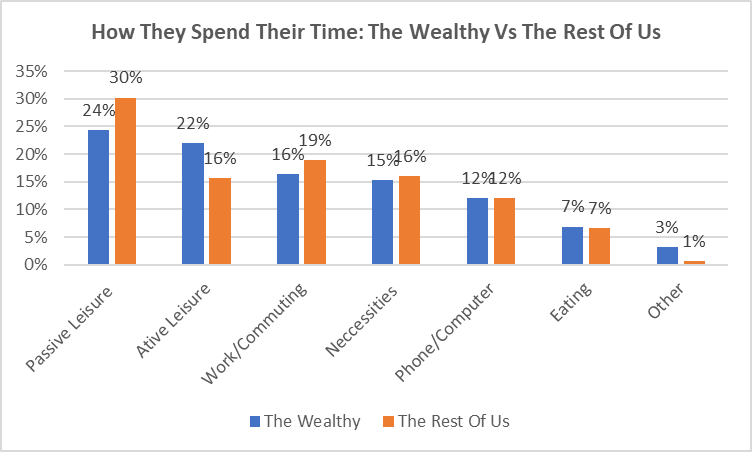2 Ways to Buy Happiness and Spend Your Time like a Millionaire
Neither of which require you to have a million dollars

Past research and general common sense tell us that wealthier people are happier than the rest of us.
Anyone paying attention knows that money can absolutely buy happiness. The only mystery is how the wealthy use money to buy happiness.
That was the central question of a 2019 paper titled “Time Use and Happiness of Millionaires,” which examined how wealthy people spent their time compared to the rest of us and measured the impact of various activities on their happiness.
The researchers conducted two studies of millionaires and the general population to determine how each group spent their time measuring the activities that positively and negatively impacted happiness.
Study 1 looked at time spent on leisure.
Study 2 looked at time spent on work.
I won’t bury the lede. The two factors that explain why the wealthier are happier than the rest of us:
They spend more time on “active” leisure.
They have more autonomy at work.
Reason #1: Less time watching Netflix, more time at the gym
Millionaires in the study spent more time on “active” leisure than “passive” leisure.
Active leisure includes exercise and volunteering.
Passive leisure includes watching TV and relaxing.
Specifically, wealthy people spent 16 fewer minutes per day relaxing and another 16 fewer minutes watching TV. They also spent 19 more minutes exercising and 8.3 more minutes volunteering each day.
Here’s a detailed breakdown of how wealthy people and the general population spent their non-work time each day.

The wealthy and regular people spent a lot of their non-work time on similar activities. They spent the exact same amount of time eating, on the phone, or doing necessities like childcare or house chores.
The major difference in time spent outside of work comes down to active vs. passive leisure activities.
So, how much happier did active leisure make wealthy people?
The researchers had numbers and statistical values measuring happiness, but words can paint a better picture than numbers. Here is the most important line from the paper.
The gap in happiness between the wealthy and the rest of us is similar to the reduction in happiness that occurs immediately after a divorce.
Reason #2: More autonomy at work
The second study focused on how the wealthy and the general population spent their time at work.
Again, there were remarkable similarities in the amount of time spent working, with each group working roughly 8 hours per day.
The major difference was the wealthy had much more control over their work than the general population.
Wealthy people spent 93% of their work time deciding what to do and how to do it compared to only 76% for the general population.
Put simply; the wealthy have more freedom in their professional life. Wealth buys freedom, and freedom buys happiness.
Not only do wealthy people have more freedom in what they work on, but they are less dependent on their paycheck to fund their lifestyle.
Once you have enough wealth to fund your lifestyle, you can quit a toxic job. This is a luxury not available to someone living paycheck to paycheck. That’s the power of “FU money.”
The wealthy in study 2 reported similar levels of increased happiness compared to regular people as they did in study 1. In this case, the increased happiness was primarily attributed to greater freedom in the workplace.
How to start spending time like a millionaire
These studies provide us with two clear actions to increase our happiness.
Spend less time on the couch and more time moving.
Pursue meaningful work that you control.
Luckily, neither of these requires you to have $1 million, and the first point is something you can take control of starting right now.
If you replace 20 minutes of watching TV with walking around the block every day for 100 days, odds are you’ll be happier.
Pursuing meaningful work that you control is a more difficult task.
For some silly reason, we have structured our society in a way that the jobs that provide the most autonomy (and happiness) are almost exclusively available to people with a 4-year degree. If you don’t have a degree, it’s difficult to land a job with a high level of freedom and high pay.
If nobody is going to give you a job with autonomy, you might have to create it.
For more insights on the connection between money and happiness, check out my “Buying Happiness” series here.
To unlock my full archive of work, consider becoming a paid subscriber.
Buy your friend a subscription and get 50% off FOR LIFE
Use the button below to buy a friend a 1-year subscription to MOAM, and I’ll give you a lifetime 50% discount on your subscription.
This article is for informational purposes only. It should not be considered Financial or Legal Advice. Not all information will be accurate. Consult a financial professional before making any significant financial decisions.



Abigail Disney (yes, that Disney) said it best: "privileges that come with a trust fund [..] time, control, security, attention, power, and choice."
“Money doesn’t buy happiness” is an excuse used by people who don’t have money to stay in their comfort zone. Ironically, they’d be more ‘comfortable’ in life if they did step out of their zone and realise money does lead to more happiness.